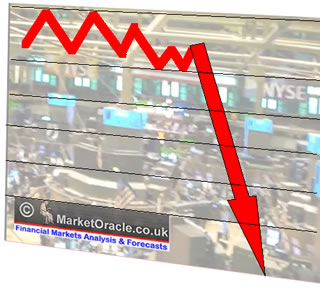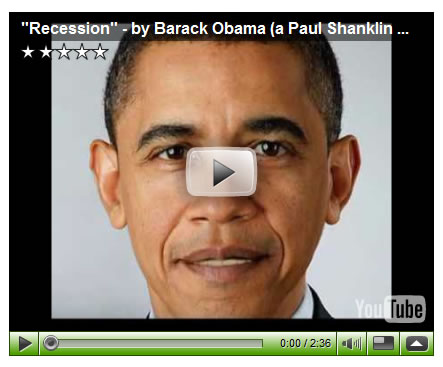Withering Green Shoots of Recovery Send Stocks Reeling
Stock-Markets / Financial Markets 2009 May 14, 2009 - 05:26 AM GMTBy: PaddyPowerTrader
 The bulls immaculate recovery lost its virginity yesterday, as news of record home foreclosures and signs of belt tightening by the all-important US consumer, in the form of very disappointing weak retail sales, sent US stocks tumbling.
The bulls immaculate recovery lost its virginity yesterday, as news of record home foreclosures and signs of belt tightening by the all-important US consumer, in the form of very disappointing weak retail sales, sent US stocks tumbling.
Wednesday was a day that many will read as confirmation that the risk rally is petering out and that neither the rationale nor the non-professional flow is there to take out the Jan 6th S&P 500 high at 943. The chart view is fairly simple: the uptrend needs to find support in the 870 - 875 region or long risk bets start coming off. Even the medium-term players will be forced to pay attention, as conviction levels are low.
Today’s Market Moving Stories
 Investors in Asia decided to follow their US counterparts and lock in some profits. Exports in Japan have fallen heavily with the stronger Japanese Yen. Overnight blue chip Sony announced that the losses incurred in 2009 would be exceeded in 2010 with losses of ¥120bn forecast to end March 2010, which weighed on the equity market. This is Sony’s first loss in 14 years.
Investors in Asia decided to follow their US counterparts and lock in some profits. Exports in Japan have fallen heavily with the stronger Japanese Yen. Overnight blue chip Sony announced that the losses incurred in 2009 would be exceeded in 2010 with losses of ¥120bn forecast to end March 2010, which weighed on the equity market. This is Sony’s first loss in 14 years.
- In Japan, the Asahi Shimbun paper reports that the government is expected to upgrade its economic assessment in May for the first time in more than three years. Without citing sources, it notes that the government will probably describe the nation’s economic deterioration as slowing.
- Bank Of Japan Governor Masaaki Shirakawa said: “The Japanese economy literally fell off a cliff … more recently, we have seen some positive signs as industrial production has increased for the first time in six months”. He added: “Although we expect the pace of deterioration in economic conditions to moderate gradually and the economy to start to level out towards the end of the year, we are closely watching developments.”
- US rating agency Standard & Poor’s issued a gloomy report on the US banking sector at the end of the US session, saying banks needed “more capital than even Basel envisioned” and that recovery in the sector might take until 2013.
- German Finance Minister Steinbrueck meanwhile described the US stress tests as “worthless”. A bit like his governments politically tainted “lets put off the evil day” bad bank plan.
ECB Predictability Flounders
In a sign of a little creative tension creeping in at the ECB yesterday, former arch hawk Axel ECB’s Weber rejected earlier comments from Marko Kranjec and reiterated that €60bn is the maximum amount for covered bond purchases. Moreover, Weber states that inflation may be negative for the coming months, yet he sees no sizeable risk of deflation. Once a recovering economy allows for it, stimuli must be withdrawn quickly, he stressed.
Such a public divergence shows just how split the council is over the best way to tackle the great recession in the Eurozone. Actually, it seems like civil war has broken out in the ECB! As I write this up pops 4 headlines from council member for Austria Nowotny.
- “ECB may buy CP & others assets”
- “ECB may widen money supply, buy government bonds
- “Interest rates may eventually reach lower bound of zero”
- “Calls inflationary concerns “unfounded”
Paradox of German Banks
The German cabinet yesterday decided on the bad bank proposal, where banks can voluntary set up a bad bank, transfer their toxic assets to such a bad bank, which in turn issues “good”, i.e. government guaranteed, securities to the good bank. The banks are responsible for all the losses, but they can stretch those losses into the future.So why are the German banks in trouble?
The answer is that there are deep-seated structural problems in the German banking system. The system has three pillars – private banks, co-operative savings banks and publicly-owned Landesbanks. This has resulted in a very fragmented banking system – there are just too many banks. In 2005 there were 0.25 credit institutions per 1000 people in Germany, twice as high as in France and four times the ratio in the UK. Does Germany really need 2500 banks?
Some of these banks, such as some of the Landesbanks, have pursued market share or political objectives and have taken on too many risks. Profitability did not seem to concern them too much.
The IMF Survey I April 2008 said there are questions “whether many banks – especially the Landesbanks – have viable business models”. The IMF reported that at the end of September 2008, public sector or quasi-public sector banks accounted for about two-thirds of German banks’ write –downs. On top of these structural problems, which resulted in low profitability, has been the problem that Germany has had a large excess of savings supply over domestic investment demand (which is what a current account surplus means). This has meant that German banks increased their exposure to foreign assets, some taking excessive risks e.g in Central and Eastern Europe.
High leverage ratios and the large scale of conduits and SIVS that were operated by some of the rescued institutions were a symptom of the problem. The extent of the downturn in the German economy – it looks like shrinking by over 6% in 2009 as compared with 2008 – is also playing a role in boosting losses.
High leverage ratios in Germany add to the potential for stress. German banks’ equity to assets ratio is low “even by European standards” according to the IMF. With the sharper than expected downturn in Germany hitting profitability and with asset quality on a deteriorating trend, the need to augment capital in German banks, or to find some way to conserve it, is becoming ever more pressing. That is why the measures taken so far are proving inadequate.
That is why there is now a scheme to set up a “bad bank” to take toxic assets off commercial banks’ balance sheets, relieving the capital constraint. The problem is how to relieve the banks of their problem assets without – just a few months before elections are due – appearing to bail out the banks, or lumbering the taxpayer with a massive bill.
The essence of the solution that is being proposed is to push the problem into the future, well beyond the election date, in the meantime massaging the balance sheets to look better than the underlying position of the banks warrants.
The essence of the scheme is an accounting sleight of hand, moving assets off bank balance sheets in the same way that banks used SIVs and conduits to sidestep regulatory burdens in years past. The approach seems to be “If SPVs got us into this mess, why can’t they get us out of it?” Similarly, having banks pay the annual charge out of dividends rather than it affecting profits seems highly questionable.
In what way is this a dividend distribution? In my view, it’s a cost and should be treated as such. In economic terms, the losses arising from the toxic assets will fall on the banks not the taxpayer – but the balance sheets will not recognise this. Neither will the Profit and Loss statement since charges are to be paid out of dividends. How can the accounts be said to represent a true and fair picture of the bank’s underlying economic position?
The scheme is in essence a time machine where losses too big to deal with today are shuffled off into the future. The contradiction between wanting to clean banks balance sheets and yet not wanting taxpayers to have to foot the bill – especially before an election – is sidestepped by the use of a sort of accounting Tardis - “Beam up my bad assets, Scotty” Captain Kirk Might have said. To which Mr Spock might have responded “This is cleaning banks’ balance sheets, Jim, but not as we know it”.
Today’s Data
US Initial Unemployment Claims (13.30): Chrysler’s plant shutdowns, which began in late April, are likely to boost the number of new filers for several weeks. Meanwhile, GM’s shuttering of nearly two dozen auto plants may also lead to elevated initial claims readings for some time. RBS expects that initial jobless claims rebounded in the week ended May 9, climbing to perhaps 640,000.US Producer Prices (13.30): In April, we expect that the headline PPI bounced by about 0.6%, while the core rate may have inched up by 0.1%. Food prices may have surged on the back of hefty gains in fruits and vegetables and eggs, while energy prices could have bounced marginally.
Earnings today from amongst others Wal Mart ($0.77), Urban Outfitters ($0.17), Kohl’s Corp ($0.42) & Blockbuster Inc ($0.15).
And finally…
Disclosures = None
By The Mole
PaddyPowerTrader.com
The Mole is a man in the know. I don’t trade for a living, but instead work for a well-known Irish institution, heading a desk that regularly trades over €100 million a day. I aim to provide top quality, up-to-date and relevant market news and data, so that traders can make more informed decisions”.
© 2009 Copyright PaddyPowerTrader - All Rights Reserved
Disclaimer: The above is a matter of opinion provided for general information purposes only and is not intended as investment advice. Information and analysis above are derived from sources and utilising methods believed to be reliable, but we cannot accept responsibility for any losses you may incur as a result of this analysis. Individuals should consult with their personal financial advisors.
PaddyPowerTrader Archive |
© 2005-2022 http://www.MarketOracle.co.uk - The Market Oracle is a FREE Daily Financial Markets Analysis & Forecasting online publication.




